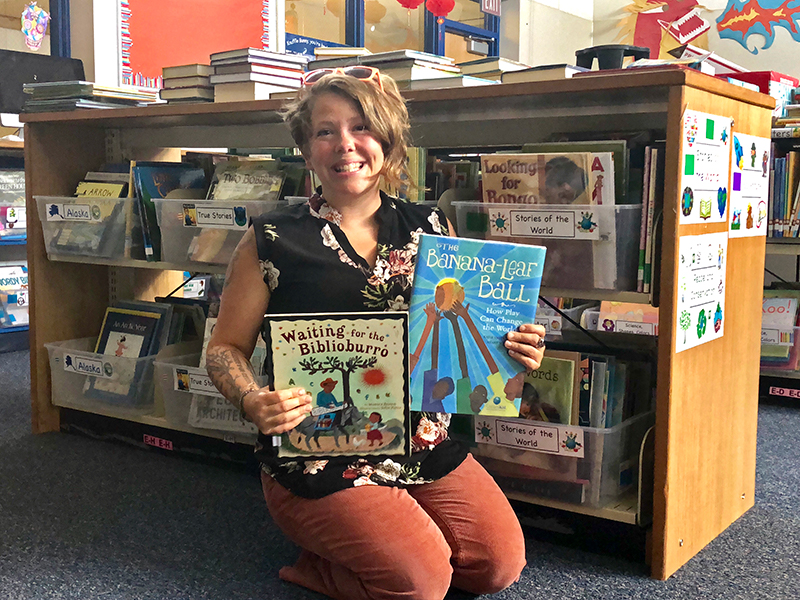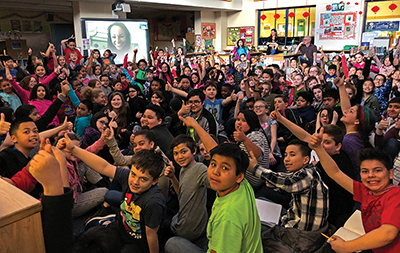World Class: Michelle Carton, SLJ's 2018 Champion of Civic Engagement
Michelle Carton builds a global education at the Tudor Elementary School in Anchorage, Alaska.

Related ArticlesAppalachian Trailblazer:
|
Over the past 20 years, Anchorage, AK, has grown to become one of the most diverse places in the United States, with the fishing and tourism industries attracting families from Latin America, Asia, Africa, and the Pacific Islands, as well as the Native Alaskan population. At the city’s Tudor Elementary School (TES)—among the 20 most diverse elementary schools in America—SLJ’s 2018 Champion of Civic Engagement, librarian Michelle Carton, is bringing a global education to the youngest students.
At TES, some 30 percent of the 350 students are English language learners. Amid so many backgrounds, Carton observed that there wasn’t a “sense of understanding of how to bridge those different cultures.” While pursuing her master’s in innovative education, Carton started researching ways to teach children to understand other people’s perspectives. In 2016, she became a Teachers for Global Classrooms Fellow sponsored by the U.S. State Department, a program to train K–12 teachers to approach their work through a global lens.
By online learning and travel to Washington, D.C., and even Morocco, Carton gained access to many resources for global education. But these programs were mainly aimed at teens; there was a void for curricula aimed at primary students. “High school is too long to wait,” Carton says. “Elementary school is the essential time to embrace global citizenship education.”
Teaching global awareness
So Carton developed the “Young Global Citizens” curriculum, which she used with her own K–6 students and other educators have used for K–12. She began by teaching kindergartners and first graders about children around the world. They learn by reading books as well as videoconferencing with classes in other countries. Carton might point out that pictures in books show that children in some parts of world don’t wear shoes. “What is in our environment that makes it so we wear shoes?” she asks the students. Inevitably one child will reply that shoes protect their feet from snow. They then have a discussion about how different environments and cultures may necessitate different practices. This makes abstract ideas easier for kids to understand. “It’s hard to describe ethnocentrism to kids,” she explains. “It’s not us versus them. We don’t have to be heroes and rescuers, just to understand the variety of global perspectives.”
 The program expanded to grades two through six. Current events such as gun violence and immigration have been popular topics of discussion with sixth graders. “Why is this something that people are talking about?” she asked students, who then brainstormed and shared about topics that present challenges in the United States and other nations, and also similarities among people in different parts of the world. “Break down those perspectives and help them understand why it is.”
The program expanded to grades two through six. Current events such as gun violence and immigration have been popular topics of discussion with sixth graders. “Why is this something that people are talking about?” she asked students, who then brainstormed and shared about topics that present challenges in the United States and other nations, and also similarities among people in different parts of the world. “Break down those perspectives and help them understand why it is.”
Carton often uses social media to bridge her students’ geographical and cultural isolation from the lower 48 states and the world. She connects with other educators on Twitter, Google+ communities, and the International Education and Resource Network (IEARN). For the International Day of Peace last September, which she extended into a Week of Peace at her school, Carton used social media to find teachers in Mexico and Arizona. Then TES students Skyped with classes on both sides of the border about what peace means to them. Students in Mexico and Arizona both said, “For us, peace means no wall,” according to Carton.
Impacting school climate
For these students, learning about current events extends into action. Students were inspired to organize cleanups in their own neighborhoods and to collect more than 2,000 books to donate to students impacted by California wildfires, tropical storms, and poverty in rural Alaska. “I know that when students leave this elementary program, they are ready for what life has to offer at a pivotal time—middle school and high school,” she says. The changes in the three years since Carton has taken the helm of the library are not just anecdotal. “The school climate has improved and bullying has gone way down, evident as people enter the building,” she says.
Carton’s own childhood experience inspired her to do this work. “I was one of those kids who fell through the cracks,” Carton explains. In and out of foster care for years, she couldn’t read until she was nine years old. “It wasn’t until I had that one teacher who did things differently” that she learned to love books.
 |
TES students during a virtual visit
|
Prior to becoming the librarian at TES, Carton was a high school and middle school classroom teacher, and also the director of youth theater company. Her innovative approach to bringing global learning to young students has earned Carton numerous honors. In 2014, she was named a BP Teacher of Excellence, and in 2018, a winner of the Henry Ford Teacher Innovator Award.
Carton also won the Follett Challenge this spring, earning TES $60,000 in books and video production equipment for the students to learn to produce their own newscast. Nearly 4,000 new books were added to the library’s collection, where many books dated from the 1990s, and she adding more science and technology titles to boost STEM-oriented learning. This outside funding is especially valuable in Alaska, where the average school library runs on an annual budget of $2,000 or less.
The lives of these Alaskan students will be featured in an upcoming video produced by BYKids.
Carton wants other teachers and librarians to be able to replicate her work, so she blogs and links to her resources at GlobalEducationAK.org. She shares her knowledge by leading professional development sessions in her local community and as far away as Morocco or Costa Rica, where she recently traveled to work with educators on a permaculture project.
Grace Hwang Lynch, a Bay Area freelance writer, blogs at HapaMama.com.
RELATED
The job outlook in 2030: Librarians will be in demand
The job outlook in 2030: Librarians will be in demand
ALREADY A SUBSCRIBER? LOG IN
We are currently offering this content for free. Sign up now to activate your personal profile, where you can save articles for future viewing






Add Comment :-
Be the first reader to comment.
Comment Policy:
Comment should not be empty !!!